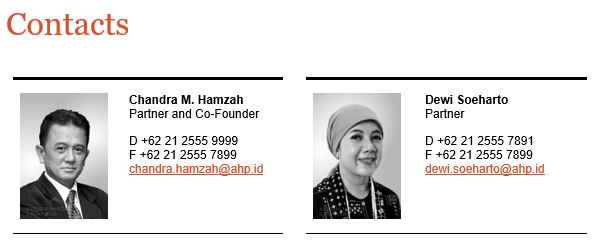Indonesia Ratifies the Beijing Treaty
The President of the Republic of Indonesia recently issued Presidential Regulation No. 2 of 2020 on the Ratification of the Beijing Treaty on Audiovisual Performance (“PR/2“). In the consideration of PR/2, the government states that the ratification of the WIPO Beijing Treaty on Audiovisual Performances (“Treaty“) is necessary as the Treaty forms the legal basis to accommodate the implementation of the protection of audiovisual performance works displayed through an electronic media.
According to the Treaty’s official website, the Treaty is a multilateral treaty that acknowledges the intellectual property rights of performers with regard to their audiovisual performances.1 The Treaty outlines the global standards in recognising the right of audiovisual performers to be compensated fairly for the use of their creative contributions. It grants economic rights as well as moral rights to performers, giving them the ability to capitalise their performances and to better protect their images.2 In short, the Treaty sets a new global standard for intellectual property protection for audiovisual performances
On 28 January 2020, Indonesia ratified the Treaty. As Indonesia is the 30th ratifying party to the Treaty, the Treaty will enter into force for its 30 contracting parties on 28 April 2020.
Behind the Treaty3
Originally, the 1961 Rome Convention for the Protection of Performers, Producers of Phonograms and Broadcasting Organisations (“Rome Convention“) granted performers the right, albeit a limited one, to oppose certain uses of their performances. The protection under the Rome Convention specifically excluded moral rights and economic rights from audiovisual fixation. On the other hand, the Rome Convention gave producers a comprehensive list of exclusive rights, including the right of making available on demand, which has become essential in light of the latest technological developments and the digital distribution of creative works.
The protection for audiovisual performance was then upgraded under the WIPO Phonograms and Performances Treaty (“WPPT“), but only in respect of the intellectual property rights of audio performers.
In 2000, a diplomatic conference that specifically dealt with audiovisual performances reached a provisional agreement on 19 substantive articles, but failed to deliver a treaty as diverging opinions on the sensitive issue of the transfer of performers’ rights to producers could not be reconciled.
Overview of the Treaty
Under the Treaty, nationals of the contracting parties are beneficiaries of the protection granted under it. Each contracting party must give the same treatment to the nationals of other contracting parties as it gives to its own nationals with regards to the exclusive rights granted under the Treaty and the equitable remuneration right.
The Treaty grants the following moral rights to performers in an audiovisual performance:
- the right to be identified as the performer of his/her performance, except where omission is dictated by the manner of the use of the performance; and
- the right to object to any distortion, mutilation or other modification of his performances that would be prejudicial to his reputation, taking due account of the nature of audiovisual fixations.
In addition, the Treaty grants six types of economic rights to performers in an audiovisual performance:
- right of performers in their unfixed performance;
- right of reproduction;
- right of distribution;
- right of rental;
- right of making available fixed performances; and
- right of broadcasting and communication to the public.
Impact on Performers
Although the above economic and moral rights for audiovisual performers are already covered in Indonesia’s Copyright Law (Law No. 28 of 2014), it seems that the intention of the government in ratifying the Treaty is to ensure that audiovisual performers enjoy the same rights as performers of a song and/or music under the law, especially as the Treaty contains the following provision on royalties or remuneration of the audiovisual performer after their rights have been transferred to the producer:
“Independent of the transfer of exclusive rights described above, national laws or individual, collective or other agreements may provide the performer with the right to receive royalties or equitable remuneration for any use of the performance, as provided for under this Treaty…”
Currently, the Copyright Law regulates that a performer’s economic rights over a song and/or music that has been assigned or transferred under an outright buyout agreement or a timeless assignment will be returned to such performer when the relevant arrangement has reached 25 years. In our view, the abovementioned provision in the Treaty will create equal standing for audiovisual performers with performers of a song and/or music under the law.
In addition, the Treaty contains provisions on rights management information. Rights management information means information that identifies the performer, their performance, the owner of any right in the performance, the terms and conditions for the use of the performance and any numbers or codes related to electronic information attached to a performance fixed in an audiovisual fixation.
The Copyright Law does not contain any provision on rights management information, except for the creator of the copyright. By ratifying the Treaty, Indonesia can adopt the rights management information for audiovisual performers, thus ensuring that they will have an adequate and effective legal remedy against any person who removes or alters their rights management information.
Conclusion
The ratification of the Treaty by Indonesia evidences the government’s commitment in protecting intellectual property of audiovisual performers in Indonesia. This protection is not only favourable for the industry, but also necessary, especially with today’s rapid technological development.

***
AHP Client Alert is a publication of Assegaf Hamzah & Partners. It brings an overview of selected Indonesian laws and regulations to the attention of clients but is not intended to be viewed or relied upon as legal advice. Clients should seek advice of qualified Indonesian legal practitioners with respect to the precise effect of the laws and regulations referred to in AHP Client Alert. Whilst care has been taken in the preparation of AHP Client Alert, no warranty is given as to the accuracy of the information it contains and no liability is accepted for any statement, opinion, error or omission.

